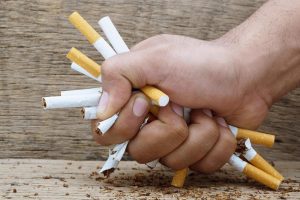World No Tobacco Day: How Smoking Harms Your Oral Health
 Almost everyone is aware of the adverse effects, including cancer, that tobacco can have on the lungs.
Almost everyone is aware of the adverse effects, including cancer, that tobacco can have on the lungs.
But not all of us know that tobacco use, both smoking and non-smoking, also represents a threat to your gums, jaw, and particularly to the soft and hard tissues of your mouth.
These risks include gum disease, oral cancer, diminished healing after surgery, receding gums, and tooth decay that can lead to cavities.
Cigarettes contain nearly 5,000 chemicals, of which 69 are known to cause cancer.
When you smoke, cigarette smoke lingers in your mouth before you exhale.
This directly affects your oral health by reducing blood flow to your gums, reducing vitamin C levels necessary to keep gums healthy, and increasing mouth temperature, which leads to cell damage.
At A Plus Dental, we want to support your oral health as part of your overall health, so we recommend that all our patients cease intake of tobacco products.
Let’s take a look at some of the dental problems tobacco-use can cause.
How Smoking Affects Your Oral Health
Teeth erode more quickly. Chewing tobacco, cigars, snuff, and any other smokeless products contain tiny particles that abrade teeth.
#1 Reduced options for dental treatment
Smoking reduces blood flow, increases bacteria, and increases gum inflammation. This can make it harder to replace lost teeth, eliminating options like implants and bridges.
Tobacco products weaken nearby teeth and jawbones. Weakened from infection or decay caused by tobacco products, they aren’t sturdy enough to support dental treatments.
#2 Gum disease becomes more challenging to treat
Smoking lowers your immune system’s ability to defend your health. Smokers who are treated for gum disease might have increased difficulty fighting the problems related to gum disease.
Smoking limits the growth of blood vessels (and their ability to bring blood and nutrients while removing wastes), which slows the healing of gum tissue after surgeries or trauma.
#3 Increased likelihood of getting sick
Due to tobacco’s effects on the immune system, uncomplicated infections can progress to much worse.
#4 Your sense of taste and smell can become dulled
Smelling like an ashtray is not the only impact smoking has on the nose. Smokers feel a dulling of their senses; smell and taste take a hit when one smokes.
Smokers can’t recognise the taste of many foods as intensely as they did before smoking, but it’s the loss of the sense of smell that diminishes the ability to taste. Ingesting hot fumes of cigarette smoke is toxic.
Some smokers realise that foods don’t taste the way they used to, but the process can be quite slow, making it difficult to detect. Quitting brings a swift return of the senses.
#5 Healing can be slower
After having a tooth extracted or some other dental surgeries. Smoking deprives the body of oxygen.
The body’s ability to heal from a wound relies on oxygen, which allows for the repair and rebuilding of cells.
In essence, it is the foundation for the redevelopment of skin tissues.
Smoking decreases the amount of oxygen to the affected area – it narrows the blood vessels in charge of carrying blood and oxygen to various parts of the body.
#6 Difficulty in correcting cosmetic dental issues
Smoking and chewing tobacco both cause tooth discolouration. Stains resulting from smoking, chewing, or dipping tend to become darker and harder to remove over time.
What About Chewing Tobacco?
Smokeless tobacco (also known as chewing tobacco or snuff) has been demonstrated to cause cancers of the lip, tongue, and mouth, as well as other areas of the body.
Smokeless tobacco, like cigarettes, can lead to increased chances of oral cancer. Smokeless tobacco products contain at least 28 chemicals known to cause cancer.
Other known health dangers include:
Risk for cancer of the esophagus, voice box, bladder and colon. Toxins in the gooey liquid created by chewing can be swallowed.
Increased risk of decay as sugar is regularly added to enhance the flavour of smokeless tobacco.
Tooth sensitivity and erosion due to grit and sand from smokeless tobacco grinding down the teeth.
What Can Be Done?
The most important thing is to quit tobacco, of course. Here are a few places you can get help.
- Your doctor
- Your dentist or oral healthcare professional at A Plus Dental
- Quitline Tel. 13 7848 (13 QUIT)
- Australian Dental Association Tel. (03) 8825 4600
But there is one other important thing to do as well.
Visit A Plus Dental regularly. Regular checkups are even more critical for patients who use tobacco.
A couple of important things take place at your six-month visits with A Plus Dental.
First, your hygienist will remove the plaque that contributes to concerns such as gum disease or tooth decay – it is extra-important for tobacco users to keep great oral health.
Next, your Campbelltown dentist performs a thorough examination designed to detect any issues related to tobacco use, including worn down teeth, discolouration, gum disease, cavities, and oral cancer, in their earliest stages.
This is particularly important for oral cancer, which is most successfully treated when caught early.
It All Adds Up at A Plus Dental!
A Plus Dental believes in individuality, honesty, compassion, trust, and comfort.
We give Campbelltown area patients, from infants to those in their golden years, relaxing and caring treatments in a comfortable environment.
Choosing A Plus Dental is your first step towards a beautiful, healthy smile with teeth that feel great in your mouth!
We have over 30 years of combined experience and treat each of our patients with the utmost care and respect.
Call us at (02) 4627 3833 or book your appointment online today.
We are located at Suite 3/300 Queen Street in Campbelltown.


